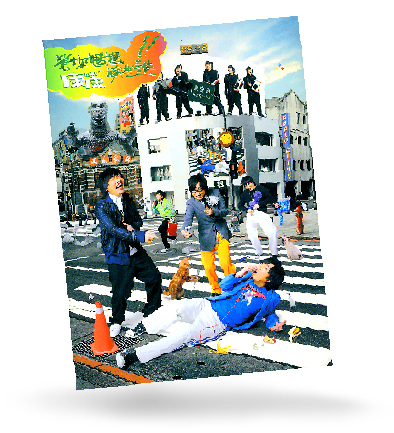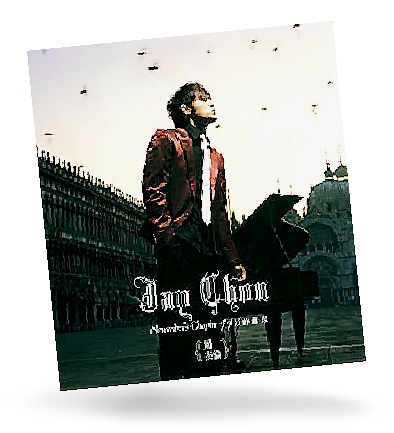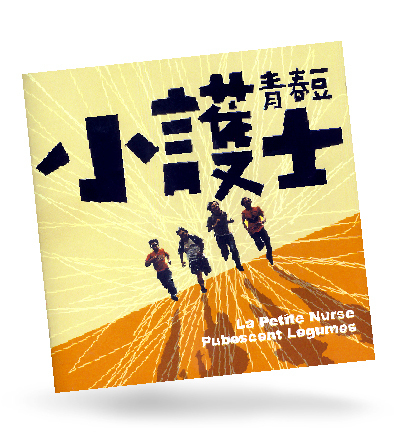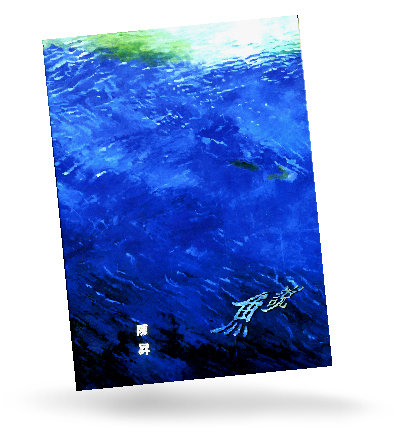Kang Kang (康康)
Don't Care Who You End Up With (管妳媽媽嫁給誰)
Sony

Love him or loath him, you have to hand it to foul-mouthed entertainer Kan Jin-rong (
Although better known for his crude humor rather than his musical prowess, Kang Kang has released a couple of albums over the past few years. Packed with cover versions of other people's tunes the records failed to capture the hearts and minds of the general public.
His latest album, however, is a far cry from his previous ventures and is, sad to say, pretty entertaining, albeit in a slightly unoriginal way. Sure it's not award-winning stuff, but there's something about the way Kang Kang mixes it up with everything from comedic and rudimentary hip-hop tunes to orchestrated piano driven ballads that work quite well.

Packed with an eclectic selection of sounds, Don't Care Who You End Up With (
The album opens with the Joy Topper-like Drain Your Glass (
Don't Care Who You End Up With is not without its highlights, however, and the album's title track on which Kang Kang mixes it up with a brass section and grinding nu-metal guitar makes for reasonably good listening.

Jay Chou (周杰倫)
November's Chopin (十一月的蕭邦)
Sony

Released to great fanfare on Tuesday, Jay Chou's (周杰倫) sixth and latest album November's Chopin (十一月的蕭邦) looked destined to become number one throughout Asia even before its release. On-line music retail outlets and music stores alike were inundated with pre-order requests a month ago when news was first leaked of the album's pending release.
Named after the renowned composer for the simple reason that, according to Chou, his songs "tend to lean towards the works of Chopin [rather] than Liszt," the album features 10 new tunes, a handful of previously released bonus tracks and, as is now the norm, a couple of music videos.
For the most part the album sees Taiwan's favorite musical son veering away from his tried-and-tested Mando-hip-hop format and is instead wooing fans with moody piano- and guitar-based ballads.
And it is these ballads that prove the highlights of the album. Here listeners get to hear Chou at his previously seldom heard best. One such tune is Nocturne (夜曲) on which Chou's vocalizes over a backdrop of easy-going guitar on a soulful number about the death of a girlfriend.
In addition to the moving ballads Chou still takes his time to croon his way through a couple of up-tempo classic Mando-pop melodies. These are, needless to say, pretty much on a par with the material that propelled Chou to superstardom four years ago and if you like Chou you'll like these.
While the crux of November Chopin may not be quite what the hordes of teenage girls who swoon whenever Chou appears on TV like, for the rest of us, who are either a little to old or too cynical to enjoy Mando-pop, Chou's latest album could be considered a breakthrough and one that should earn the already popular star even more fans.
La Petite Nurse (小護士樂團)
Pubescent Legumes (青春豆)
Rock
La Petite Nurse (
Unlike many of its peers, La Petite Nurse doesn't follow the over-played format of power pop and rock. Its music is hard to categorize. The band is able to switch and swap from Coldplay-like downbeat numbers to up-beat and typical Taiwan indie scene noise without either missing a beat or sounding stupid.
This ability is markedly noticeable on the band's recently released debut, Pubescent Legumes (青春豆) on which the four-piece perform a mixed bag of tunes.
While there's nothing wrong with the band's more rock/pop oriented tunes oriented such as the Oasis-like opener Into The Sun, the power pop tune Smash the TV (摔電視), the jerky rock anthem Spice Girl (辣妹) and the great alt-pop/blues inspired number Mad Mask (
Downbeat and Coldplay-like tunes such as Die For You, White Lie (
Bobby Chen (陳昇)
Fish Says (魚說)
Rock
The bad boy of Taiwanese pop/rock returns with a new album this month entitled Fish Says (
Instead of sing-a-long anthems and heavy rock riffs Chen's Fish Says is a melancholy affair that sees the popular singer tackling material of an easy listening nature.
Slow ballads, folksy guitar, orchestrated moments and traces of world music all combine to give Fish Says an appeal that is so often lacking from Chen's less personal and more commercial releases.
After a couple of iffy openers the album's title track cuts in like a breath of fresh air. Fish Says sees Chen doing his utmost to sound like any one of a dozen indie-folk crooners, but instead of coming off the worse for the experience Chen is on top form. He can't quite hit all the high notes, but the tune's uplifting beats compensates for his rather off key vocals.
Other tunes of note include the offbeat, yet interesting tango-influenced 1989, the mild rock/blues-like London's Disabled Spaces (倫敦廢人區) and the wistful, piano driven Dream River (夢河).
The bottom line is that Fish Says might not be what one would expect from the hard drinking, hard playing and aging womanizing pop star, but Chen's pensive musical mood pays dividends on what is, in the end, a pleasing album.

April 28 to May 4 During the Japanese colonial era, a city’s “first” high school typically served Japanese students, while Taiwanese attended the “second” high school. Only in Taichung was this reversed. That’s because when Taichung First High School opened its doors on May 1, 1915 to serve Taiwanese students who were previously barred from secondary education, it was the only high school in town. Former principal Hideo Azukisawa threatened to quit when the government in 1922 attempted to transfer the “first” designation to a new local high school for Japanese students, leading to this unusual situation. Prior to the Taichung First

When the South Vietnamese capital of Saigon fell to the North Vietnamese forces 50 years ago this week, it prompted a mass exodus of some 2 million people — hundreds of thousands fleeing perilously on small boats across open water to escape the communist regime. Many ultimately settled in Southern California’s Orange County in an area now known as “Little Saigon,” not far from Marine Corps Base Camp Pendleton, where the first refugees were airlifted upon reaching the US. The diaspora now also has significant populations in Virginia, Texas and Washington state, as well as in countries including France and Australia.

On April 17, Chinese Nationalist Party (KMT) Chairman Eric Chu (朱立倫) launched a bold campaign to revive and revitalize the KMT base by calling for an impromptu rally at the Taipei prosecutor’s offices to protest recent arrests of KMT recall campaigners over allegations of forgery and fraud involving signatures of dead voters. The protest had no time to apply for permits and was illegal, but that played into the sense of opposition grievance at alleged weaponization of the judiciary by the Democratic Progressive Party (DPP) to “annihilate” the opposition parties. Blamed for faltering recall campaigns and faced with a KMT chair

Article 2 of the Additional Articles of the Constitution of the Republic of China (中華民國憲法增修條文) stipulates that upon a vote of no confidence in the premier, the president can dissolve the legislature within 10 days. If the legislature is dissolved, a new legislative election must be held within 60 days, and the legislators’ terms will then be reckoned from that election. Two weeks ago Taipei Mayor Chiang Wan-an (蔣萬安) of the Chinese Nationalist Party (KMT) proposed that the legislature hold a vote of no confidence in the premier and dare the president to dissolve the legislature. The legislature is currently controlled